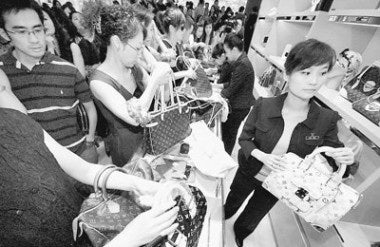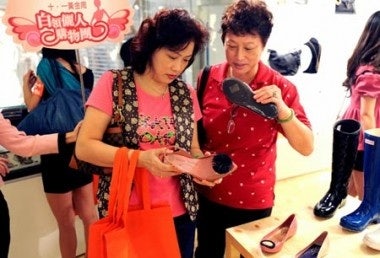Plans Have Been Discussed For A Year#

One of the big stories this week in China's luxury market was the possibility that Beijing may soon lower China's notoriously high luxury taxes, which can tack upwards of 30-40 percent onto the price of imported high-end goods. Along with a raft of other factors, such as better customer service and choice and prestige among friends, much higher prices for luxury goods within mainland China has been singled out as a key reason more than half of Chinese luxury purchases are currently made overseas. As former deputy commerce minister Wei Jianguo told China Daily this week, "There will be at least two rounds of reductions this year on a large range of goods."
Wei's remarks follow the release of Chinese Premier Wen Jiabao's annual government work report this Monday, which again prioritized domestic consumption. Said Wen in the report, "Expanding domestic consumption, especially consumer demand, is the key to China maintaining stable and rapid economic growth, and is this year's priority." In response to the report, Liu Kegu, a former official on fiscal and tax reform at the Ministry of Finance, said Chinese government ministries "must get ready for the [luxury tax reduction]."
Rumors of a luxury tax cut in China set off a storm of speculation throughout the week, and sent shares for Prada and Burberry -- brands with huge presence in the country -- soaring.
The only problem with reading too much into the rumors is that we've heard them before.

One year ago, at the 2011 National People’s Congress (两会), Dalian Wanda Group chairman Wang Jianlin (王建林) and others called out to the Chinese government to reduce import duties, saying high luxury taxes inhibit job growth and decrease tax revenue, as “Chinese people sit on airplanes to deliver jobs and tax money to foreign countries.” In the months that followed, signs indicated that Beijing was listening to growing calls to abolish or lower its luxury tax code. By June, Ministry of Commerce spokesman Yao Jian sought to inject himself into the debate, saying, "the direction [the government] will take is to further reduce import tariffs on middle- and high-end products."
By October, though, little had been done. Instead of moving quickly to cut luxury taxes, bureaucrats in Beijing had busied themselves trying to pin down the exact meaning of the word "luxury." As Lu Peijun, deputy head of the General Administration of Customs, told China Daily at the time, "Tariff cuts are an issue of the top priority with policymakers. However, the definition of luxury products should be made more accurate to better delineate tariff policies.” Along with semantic roadblocks, another reason given by analysts for Beijing's slow moves was infighting between the Ministries of Finance and Commerce on what should be done. While the Ministry of Commerce strongly supports tariff cuts to spur more Chinese consumers to shop domestically, China Daily notes that the Ministry of Finance opposes the cuts. And in typically opaque fashion, Shen Danyang, a spokesman for the Ministry of Commerce, said in October that “it’s unclear whether the two ministries have reached a consensus.”
By the end of 2011, after months of wrangling, the only progress seen on the luxury tax reduction was a vague assurance by Beijing that import taxes would be reduced for 730 consumer products, including high-end cosmetics, cigarettes and liquor. However, as Jing Daily pointed out last month, these moves have had little effect, as price increases of anywhere from 5-15 percent by the brands themselves have outpaced tax reductions (which averaged a weak 4.4 percent).
Though we'll wait to see whether Beijing enacts another round of more comprehensive tax reforms for the luxury sector, we're skeptical that any further moves will spur domestic consumption in any significant way. As we've noted in the past, the luxury tax in China is just one tariff among many that is tacked on to imported goods. If that luxury import tax is slashed, consumers in China still need to contend with a stiff consumption tax and VAT, not to mention regular price increases by brands.
